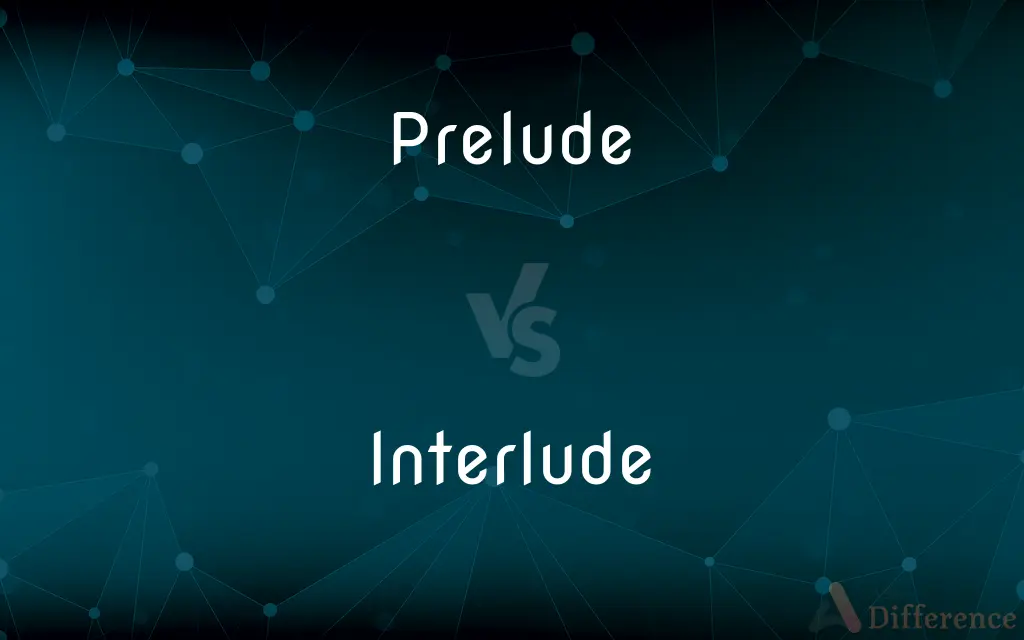Prelude vs. Interlude — What's the Difference?
Edited by Tayyaba Rehman — By Urooj Arif — Updated on April 20, 2024
A prelude serves as an introductory piece of music, often setting the tone for what follows, whereas an interlude acts as a break within the main action, offering variety or contrast.

Difference Between Prelude and Interlude
Table of Contents
ADVERTISEMENT
Key Differences
A prelude is typically used to introduce a larger musical composition, establishing thematic or harmonic ideas that will be explored throughout the piece. In contrast, an interlude appears within the body of a musical work or performance, providing a pause or a distinct shift in mood or theme.
While a prelude sets the stage for a performance or a musical sequence, interludes can serve as transitions between significant sections of a work, often giving performers and listeners a momentary rest or a new perspective.
Preludes are often composed to be inherently connected to the subsequent music, reflecting and enhancing the main themes. On the other hand, interludes might not always share thematic material with surrounding sections, sometimes serving purely decorative or practical purposes.
In classical concerts, a prelude might precede an opera or a ballet, setting a sonic scene. Whereas, interludes might be employed during scene changes or to introduce a new act within these performances.
While preludes are integral to the structure and presentation of a musical piece, interludes are optional and can vary greatly in style and purpose, reflecting the composer’s intentions or specific requirements of the performance.
ADVERTISEMENT
Comparison Chart
Function
Introduces and sets up main musical work
Provides a break within the main musical work
Position
Usually at the beginning
Anywhere within the main work
Thematic Link
Closely related to the main work
May or may not relate to the main themes
Purpose in Drama
Sets the tone or background for the story
Used during transitions or scene changes
Length
Generally shorter compared to main work
Varies, generally short
Compare with Definitions
Prelude
Early indications or signs of what is to follow.
The dark clouds were a prelude to a powerful storm.
Interlude
An intervening period of time.
She enjoyed a peaceful interlude in a busy day of meetings.
Prelude
A preliminary to something more important.
The overture was a prelude to a thrilling opera performance.
Interlude
A short play or performance in between the acts of a play.
The interlude featured a comedic mime act.
Prelude
An introductory piece of music.
The pianist performed a Chopin prelude at the start of the concert.
Interlude
A musical composition inserted between the parts of a longer musical work.
The interlude provided a soothing contrast to the preceding energetic movement.
Prelude
A short piece of music that introduces a longer piece.
The orchestra’s prelude beautifully set the stage for the symphony.
Interlude
A period of time between events.
There was a brief interlude between the two lectures.
Prelude
An action or event serving as an introduction to something more important.
The meeting was a mere prelude to the formal negotiations.
Interlude
A break or interval during a lengthy activity.
We took a coffee interlude in the middle of our meeting.
Prelude
An action or event serving as an introduction to something more important
A ceasefire had been agreed as a prelude to full peace negotiations
Interlude
An intervening episode, feature, or period of time
"Kerensky has a place in history, of a brief interlude between despotisms" (William Safire).
Prelude
An introductory piece of music, most commonly an orchestral opening to an act of an opera, the first movement of a suite, or a piece preceding a fugue.
Interlude
A short farcical entertainment performed between the acts of a medieval mystery or morality play.
Prelude
Serve as a prelude or introduction to
The bombardment preluded an all-out final attack
Interlude
A 16th-century genre of comedy derived from this.
Prelude
An introductory performance, event, or action preceding a more important one; a preliminary or preface.
Interlude
An entertainment between the acts of a play.
Prelude
A piece or movement that serves as an introduction to another section or composition and establishes the key, such as one that precedes a fugue, opens a suite, or precedes a church service.
Interlude
(Music) A short piece inserted between the parts of a longer composition.
Prelude
A similar but independent composition for the piano.
Interlude
An intervening episode, etc.
Prelude
The overture to an oratorio, opera, or act of an opera.
Interlude
An entertainment between the acts of a play.
Prelude
A short composition of the 1400s and early 1500s written in a free style, usually for keyboard.
Interlude
(music) A short piece put between the parts of a longer composition.
Prelude
To serve as a prelude to.
Interlude
(transitive) To provide with an interlude.
Prelude
To introduce with or as if with a prelude.
Interlude
A short entertainment exhibited on the stage between the acts of a play, or between the play and the afterpiece, to relieve the tedium of waiting.
Dreams are but interludes, which fancy makesWhen monarch reason sleeps.
Prelude
To serve as a prelude or introduction.
Interlude
A form of English drama or play, usually short, merry, and farcical, which succeeded the Moralities or Moral Plays in the transition to the romantic or Elizabethan drama.
Prelude
An introductory or preliminary performance or event.
Interlude
A short piece of instrumental music played between the parts of a song or cantata, or the acts of a drama; especially, in church music, a short passage played by the organist between the stanzas of a hymn, or in German chorals after each line.
Prelude
(music) A short, free-form piece of music, originally one serving as an introduction to a longer and more complex piece; later, starting with the Romantic period, generally a stand-alone piece.
Interlude
Any intervening period of time, space, etc.; a pause between phases of an activity.
Prelude
(programming) A standard module or library of subroutines and functions to be imported, generally by default, into a program.
Interlude
An intervening period or episode
Prelude
(figurative) A forerunner to anything.
Interlude
A brief show (music or dance etc) performed between the sections of another performance
Prelude
To introduce something, as a prelude.
Interlude
Perform an interlude;
The guitar player interluded with a beautiful improvisation
Prelude
To play an introduction or prelude; to give a prefatory performance.
Prelude
An introductory performance, preceding and preparing for the principal matter; a preliminary part, movement, strain, etc.; especially (Mus.), a strain introducing the theme or chief subject; a movement introductory to a fugue, yet independent; - with recent composers often synonymous with overture.
The last Georgic was a good prelude to the Ænis
The cause is more than the prelude, the effect is more than the sequel, of the fact.
Prelude
To play an introduction or prelude; to give a prefatory performance; to serve as prelude.
The musicians preluded on their instruments.
We are preluding too largely, and must come at once to the point.
Prelude
To introduce with a previous performance; to play or perform a prelude to; as, to prelude a concert with a lively air.
Prelude
To serve as prelude to; to precede as introductory.
[Music] preluding some great tragedy.
Prelude
Something that serves as a preceding event or introduces what follows;
Training is a necessary preliminary to employment
Drinks were the overture to dinner
Prelude
Music that precedes a fugue or introduces an act in an opera
Prelude
Serve as a prelude or opening to
Prelude
Play as a prelude
Common Curiosities
Are interludes always musical, or can they be spoken or silent?
Interludes can be musical, spoken, or even silent, serving various artistic and practical purposes in a performance.
Can an interlude stand alone as an independent piece?
Yes, while typically part of a larger work, some interludes are composed to stand alone or be performed separately.
How does the thematic content of interludes affect the overall experience of a performance?
Interludes can enhance the experience by offering contrast, relief, or additional insight into the themes, thereby enriching the audience's engagement.
What is the historical origin of the prelude?
The prelude originated in the Renaissance as an introductory piece for live performances, evolving significantly during the Baroque period.
Is a prelude necessary for every musical composition?
No, a prelude is not necessary for every musical composition; its use depends on the composer's intentions and the structure of the work.
How do composers decide where to place an interlude in a musical piece?
The placement of an interlude is often dictated by the narrative flow, thematic requirements, or dramatic needs of the performance.
Can interludes serve as a conclusion to a musical piece?
Interludes generally serve as breaks or transitions, but in some compositions, they can lead into a finale or conclusion.
Are preludes typical in modern musical genres outside of classical music?
Yes, preludes are used in various modern genres, including jazz and pop, to set the tone or thematic foundation of albums or performances.
Do preludes always precede operas and ballets?
While commonly used to introduce operas and ballets, preludes are not mandatory for these forms and may be omitted based on artistic direction.
What role do interludes play in contemporary theatre?
In contemporary theatre, interludes are often used to shift tone, introduce new themes, or provide audiences with a reflective pause.
Can a prelude be purely instrumental, or does it include vocals?
Preludes can be purely instrumental or include vocals, depending on the composition's requirements and the composer's vision.
What impact does a well-composed prelude have on the audience's anticipation?
A well-composed prelude can significantly heighten the audience's anticipation and emotional engagement, setting the stage for the narrative or musical journey.
What is the typical duration of a prelude in classical music?
In classical music, preludes can vary in length but are typically between two to ten minutes long.
How are interludes incorporated into film scores?
In film scores, interludes may be used to underscore transitions between scenes, enhance emotional shifts, or underscore action without dialogues.
How do performers approach the transition between a prelude or interlude and the main sections of a performance?
Performers typically use the mood and tempo set by the prelude or interlude to seamlessly transition into the main sections, maintaining the flow and integrity of the performance.
Share Your Discovery

Previous Comparison
Ether vs. Space
Next Comparison
Remanent vs. RemnantAuthor Spotlight
Written by
Urooj ArifUrooj is a skilled content writer at Ask Difference, known for her exceptional ability to simplify complex topics into engaging and informative content. With a passion for research and a flair for clear, concise writing, she consistently delivers articles that resonate with our diverse audience.
Edited by
Tayyaba RehmanTayyaba Rehman is a distinguished writer, currently serving as a primary contributor to askdifference.com. As a researcher in semantics and etymology, Tayyaba's passion for the complexity of languages and their distinctions has found a perfect home on the platform. Tayyaba delves into the intricacies of language, distinguishing between commonly confused words and phrases, thereby providing clarity for readers worldwide.














































